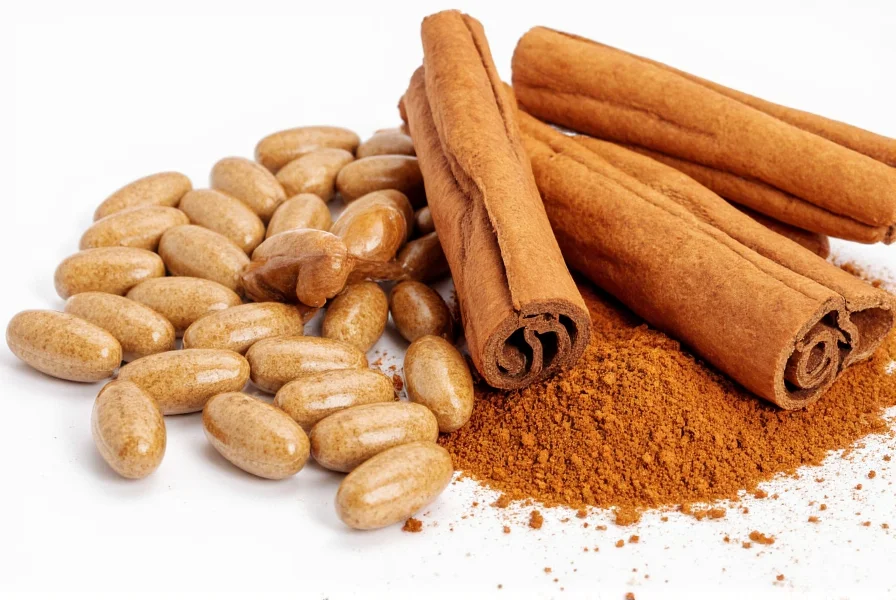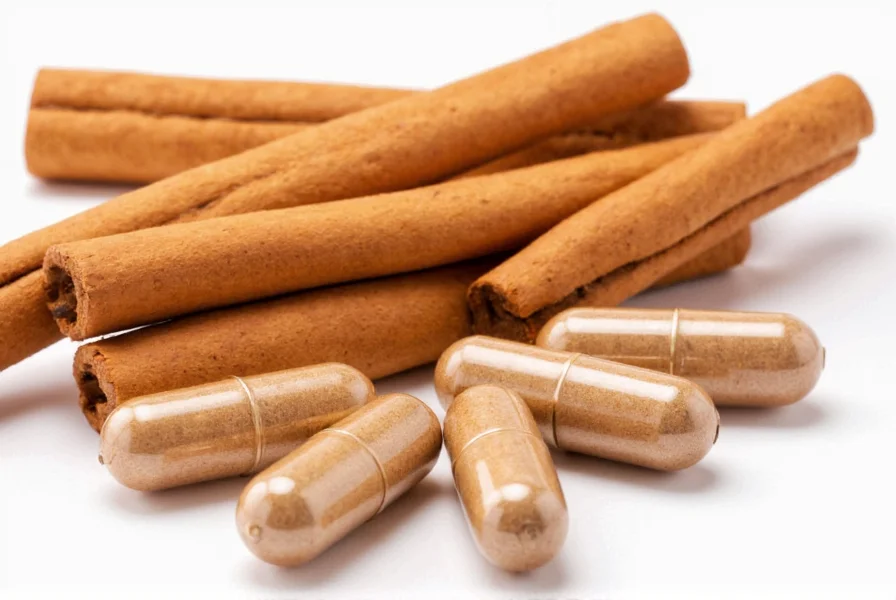For health-conscious individuals exploring natural supplements, cinnamon capsules present a convenient way to potentially harness the benefits of this ancient spice. Unlike culinary cinnamon, these standardized supplements provide consistent dosing of active compounds like cinnamaldehyde and polyphenols. Understanding what science actually says about cinnamon capsules versus popular claims is essential for making informed decisions about your health.
What Are Cinnamon Capsules and How Do They Work?
Cinnamon capsules contain concentrated extracts from the bark of Cinnamomum trees, primarily processed into standardized supplements. Two main varieties appear in supplement form:
| Type | Characteristics | Supplement Considerations |
|---|---|---|
| Ceylon Cinnamon | "True" cinnamon, milder flavor, lower coumarin | Generally preferred for long-term supplementation |
| Cassia Cinnamon | More common, stronger flavor, higher coumarin | Limited duration use recommended due to liver concerns |
The active compounds in cinnamon—particularly cinnamaldehyde, cinnamic acid, and cinnamate—contribute to its biological effects. When consumed in capsule form, these compounds enter systemic circulation after digestion, potentially influencing various physiological processes. The encapsulation process preserves these compounds better than culinary use, where heat and oxidation can degrade active ingredients.
Scientifically-Supported Health Benefits of Cinnamon Supplements
Blood Glucose Regulation
Multiple clinical studies indicate cinnamon supplements may help moderate blood sugar levels. A comprehensive 2010 meta-analysis published in the Journal of Medicinal Food found that cinnamon supplementation significantly reduced fasting blood glucose levels in people with type 2 diabetes. The mechanism appears to involve improved insulin sensitivity and slowed gastric emptying.
For those researching natural blood sugar support supplements, cinnamon capsules represent one evidence-backed option, though they shouldn't replace prescribed diabetes medications without medical supervision.
Antioxidant and Anti-Inflammatory Properties
Cinnamon ranks exceptionally high on the Oxygen Radical Absorbance Capacity (ORAC) scale, measuring antioxidant capacity. Research in Oxidative Medicine and Cellular Longevity demonstrates that cinnamon's polyphenols combat oxidative stress by neutralizing free radicals and boosting the body's own antioxidant enzymes.
These anti-inflammatory effects of cinnamon supplements may particularly benefit individuals with chronic inflammatory conditions. The encapsulated form ensures consistent delivery of these compounds compared to variable culinary use.
Cardiovascular Health Support
Several studies suggest cinnamon supplementation positively affects cardiovascular risk markers. Research published in Nutrition Research indicates that daily cinnamon consumption may reduce triglycerides, LDL cholesterol, and total cholesterol levels while maintaining HDL levels.
For those investigating cinnamon capsules for heart health benefits, the evidence suggests modest improvements in lipid profiles, though more long-term studies are needed to confirm cardiovascular outcomes.
Important Considerations for Safe Usage
Coumarin Content and Safety
Cassia cinnamon contains significant coumarin, which in high doses may cause liver toxicity. The European Food Safety Authority recommends a maximum daily intake of 0.1 mg coumarin per kilogram of body weight. Ceylon cinnamon contains negligible coumarin, making it preferable for regular supplementation.
When selecting low coumarin cinnamon supplements, check labels for "Ceylon" specification or explicit coumarin content disclosure. Reputable manufacturers typically provide this information.
Potential Medication Interactions
Cinnamon supplements may interact with certain medications:
- Diabetes medications (risk of hypoglycemia)
- Blood thinners (increased bleeding risk)
- Liver-metabolized drugs (due to coumarin content)
Individuals taking prescription medications should consult healthcare providers before starting cinnamon supplementation. This is particularly important when considering cinnamon supplements with blood thinners.
Evaluating Research Quality on Cinnamon Benefits
Not all studies on cinnamon supplements carry equal weight. High-quality research typically features:
- Randomized, double-blind, placebo-controlled designs
- Adequate sample sizes (typically 30+ participants per group)
- Standardized extracts with specified active compound concentrations
- Duration of at least 8-12 weeks
Many promising findings come from short-term studies with small sample sizes. When researching scientific evidence for cinnamon capsules, prioritize systematic reviews and meta-analyses over single-study claims.

Practical Guidance for Supplement Selection
Choosing effective cinnamon supplements requires attention to several factors:
Label Transparency
High-quality products clearly state:
- Cinnamon species (Ceylon preferred for regular use)
- Standardized extract concentration
- Coumarin content (for Cassia products)
- Third-party testing verification
Dosage Considerations
Research suggests effective doses typically range from 120mg to 6,000mg daily, divided into multiple doses. Most studies showing blood sugar benefits used 1-3 grams daily. For those seeking optimal dosage of cinnamon supplements, starting with lower doses and monitoring effects is advisable.
Realistic Expectations for Cinnamon Supplement Benefits
Cinnamon capsules shouldn't be viewed as miracle cures. The most realistic expectations include:
- Modest improvements in blood sugar regulation
- Gradual reduction in inflammatory markers
- Supportive role alongside comprehensive lifestyle changes
- Noticeable effects typically requiring 8-12 weeks of consistent use
When evaluating how long to take cinnamon supplements, consider them part of a long-term wellness strategy rather than a quick fix. Individual responses vary significantly based on genetics, existing health conditions, and overall lifestyle factors.
Conclusion: A Balanced Perspective on Cinnamon Supplements
Cinnamon capsules offer a convenient method to potentially access the health benefits of this ancient spice with greater consistency than culinary use. While research shows promise for blood sugar regulation, antioxidant protection, and inflammation reduction, effects are generally modest and vary between individuals.
The most significant benefits appear when cinnamon supplementation complements other healthy lifestyle practices rather than serving as a standalone solution. Choosing high-quality Ceylon cinnamon products, understanding realistic expectations, and consulting healthcare providers—particularly for those with medical conditions—represent essential steps for safe and potentially beneficial use.
How quickly do cinnamon capsules show effects on blood sugar?
Most clinical studies showing blood sugar improvements used cinnamon supplementation for 8-12 weeks. Individual responses vary, with some noticing subtle changes within 2-4 weeks while others may require longer consistent use. Effects are generally modest and work best alongside dietary changes and exercise.
What's the difference between Ceylon and Cassia cinnamon supplements?
Ceylon cinnamon ("true" cinnamon) contains significantly less coumarin than Cassia cinnamon, making it safer for long-term supplementation. Cassia is more common and less expensive but contains higher coumarin levels that may cause liver issues with prolonged high-dose use. For regular supplementation, Ceylon is generally recommended.
Can I take cinnamon capsules with my diabetes medication?
Cinnamon may enhance the effects of diabetes medications, potentially causing hypoglycemia. Always consult your healthcare provider before combining cinnamon supplements with diabetes medications. They may need to adjust your medication dosage and will monitor your blood sugar levels more closely.
What's the recommended daily dosage for cinnamon capsules?
Research suggests effective doses typically range from 120mg to 2,000mg of standardized extract daily. Most studies showing benefits used 1-3 grams of cinnamon powder equivalent. Start with lower doses (250-500mg) and gradually increase while monitoring your body's response. Consult a healthcare provider for personalized recommendations.
Are there any side effects of long-term cinnamon capsule use?
Long-term use of Cassia cinnamon supplements may cause liver issues due to coumarin content. Ceylon cinnamon has minimal coumarin and is safer for extended use. Other potential side effects include mouth sores, lowered blood sugar, and possible interactions with medications. Regular blood tests are recommended for those using cinnamon supplements long-term.











 浙公网安备
33010002000092号
浙公网安备
33010002000092号 浙B2-20120091-4
浙B2-20120091-4